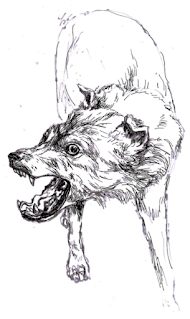Once, when a plague had come to the land, they came with a crowd of people, and said: ‘We are all making offerings to the gods, so they might ward off the plague. Will you not help to calm their wrath, or did you bring the plague over the land with your arts?’
‘No,’ Minerva said, ‘since I do not know any gods that do evil, I cannot ask them to be nicer. I only know one “god” — that is Wralda’s spirit — and because “god” means good, he also does no evil.’
‘Where does evil come from then?’ the priests asked.
‘All evil comes from yourselves and from the stupidity of the people that walk into your trap.’
‘So if your supreme being is all that good, then why does he not avert evil?’ the priests asked.
Hellenia answered: ‘Frya has put us on the path, and the Carrier that is time must do the rest. For all disasters, counsel and help can be found, but Wralda wants us to search ourselves, so we shall become strong and wise. If we refuse, he lets us squeeze out our own tumors, so we shall experience the results of wise and foolish deeds.’
A prince replied: ‘I would imagine it better to simply ward off disaster.’
‘Of course,’ Hellenia answered, ‘because then people would remain like tame sheep. You and the priests want to protect, but also to shear and slaughter them. But that is not what our supreme being wants. He wants us to help each other, but also that all be free and become wise.
Because we want that too, our folk elects our leaders, aldermen, counselors, and all chieftains and masters from the wisest of the good people, so all will do their best to become wise and good. This way, we will know and teach the folks at the same time, that only being wise and acting wisely leads to glory.’
‘That is quite a statement,’ the priests said, ‘but if you imply that the plague is a result of our ignorance, then would Nyhellenia be so good as to live up to her proud name and enlighten us?’
‘Yes’, Hellenia said. ‘Crows and other birds only feed on foul carrion, whereas the plague not only likes foul carrion, but also foul ethics, customs, and addictions. If you want the plague to leave for good, you must overcome the addictions and all must become pure, inside and out.’
‘We want to believe your counsel is good’, said the priests, ‘but tell us how we are supposed to improve all the people under our rule?’
Then Hellenia rose from her seat and said: ‘The sparrows follow the sower, the folks their good leaders. Therefore, you must begin by purifying yourselves, so that you may look within and without, without turning red from shame before your own conscience. Now, instead of purifying the people, you have invented foul feasts where they drink so excessively that they end up rooting in the mud like pigs, ready to satisfy your vile lusts.’




























































































